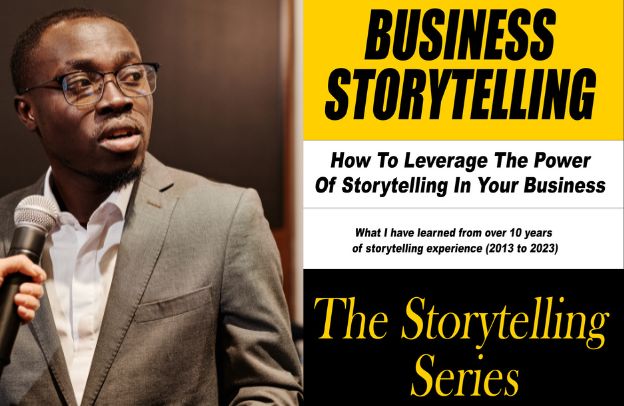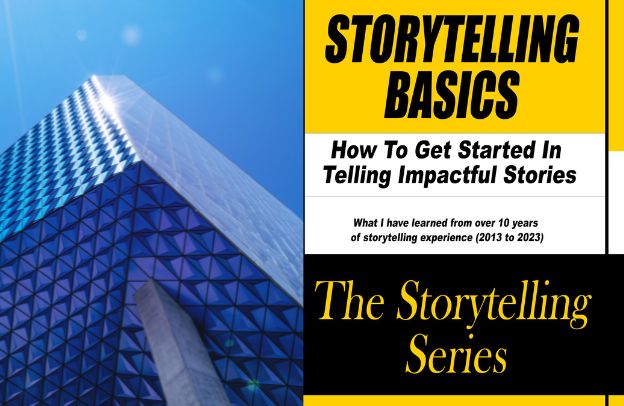How to Master Your Storytelling Skills – Business Storytelling

In a competitive business landscape, mastering the art of storytelling can be the catalyst that sets your small business apart. Captivating your audience with compelling narratives has the power to forge deep connections, inspire loyalty, and amplify your brand’s reach.
Want to learn more about storytelling? Start by downloading the first chapter of The Storytelling Series for Small Businesses.
Whether you are conveying your company’s origin, showcasing your products or services, or engaging with customers on social media, honing your storytelling skills is the key to creating an unforgettable brand experience.
Hello and welcome to today’s short read. I am Obehi Ewanfoh, author of The Storytelling Series and host of The Obehi Podcast. If you are a small business owner or a content entrepreneur who wants to build your influence and stand out from the noise out there, then join us at AClasses Academy with dozens of online training classes to level up. We are available at AClasses.org.
You can also reach me at ObehiEwanfoh.com where you can take advantage of our storytelling service “Elevate with storytelling”. You never want to be just another content entrepreneur or a small business owner out there because you can be intentional by owning your voice and leveraging it to your advantage irrespective of where you stand now.
Today’s short read is from book 4 of The Storytelling Series for Small Businesses and Content Creators. The book is titled, MASTERING STORYTELLING SKILLS: How To Build Your Influence Through Stories and it’s available on Amazon if you want to get a copy for yourself and read along.
We are in Chapter 1 of the book. Now, the reading:
“From the ancient great African civilizations, the Greeks and Romans, and the present world, storytelling has remained an art form that has been used by people to connect, share knowledge and experiences, and build relationships. Maybe you are a small business owner, a content creator, or you simply want to improve your communication skills, mastering the art of storytelling can help you achieve different goals and build your influence.
In today’s world, storytelling has become an integral part of marketing and advertising. As a business owner or content creator, the ability to tell a good story can be the difference between success and failure. This is as best as it can be put. So, get ready to master your storytelling skills.
The following is a nice clip from Eccostories.com:
“Traditional advertising was based on a one-way flow of information: from brand to consumer. Now, a brand sits in conversation with those who experience the brand. Authorship of your brand story doesn’t sit in the CMO’s office. It sits in the hands of your Facebook followers, your customers, your intern, your shop clerk.”
In the article, “What’s a brand story, and why does my company need one?” the writer added that a brand story is a cohesive narrative that encompasses the facts and feelings that are created by your brand (or business, if you prefer). So for this and many other reasons, you need to master the art of storytelling so you can better leverage it in your business because all successful businesses have a story to tell.
While traditional advertising focuses on showcasing and explaining your brand, storytelling requires something deeper: the ability to evoke an emotional response. A well-told story has the power to captivate and move people in ways that simple product features and benefits cannot. It’s not just about what your brand does, but about the impact, it has on people’s lives. And that impact can only be communicated through the emotional resonance of a compelling story.
Apple, for example, is a master at crafting a cohesive brand narrative. Everything from the sleek design of their computers to the personalized experience of the Genius Bar, and even their product launch events, all come together to reinforce the story of a company driven by innovation, beauty, and the desire to disrupt the norm. Through these consistent messaging strategies, Apple has managed to position itself as a thought leader in their industry, dominating the conversation and shaping the narrative around its brand.
Now, imagine attending a training course or a seminar on a topic you are truly passionate about. It’s the instructors who told captivating stories to illustrate their points that will make the biggest impression on you. That is a testament to the power of storytelling and how it can strengthen your connections and better engage your audience.
To craft a good story, you need to tap into emotions and connect with your audience. Each story must, of course, have a point or reason for being told, whether it’s to inspire, teach, or entertain. Writing your stories down and following a formula with a beginning, middle, and end, can help you refine and develop your narrative. And with practice, storytelling can become second nature, like driving a car. So, you need to keep practicing if you need to master your storytelling skills.
Mastering storytelling skills is a valuable tool for anyone looking to increase their influence, whether in a business, personal or creative environment. It allows you to connect with your audience, evoke emotions, and make a lasting impact. With dedication and practice, you too can become a master storyteller.
Here are 4 tips to master your storytelling skill even if you are a beginner in the craft:
- Start with a clear message: Every good story has a message or lesson at its core. Before you begin crafting your story, identify what message you want to convey to your audience. This will help you stay focused and ensure that your story has a clear purpose.
- Make it relatable: Do you want to master your storytelling skill? Learn to make your message relatable to your audience. No dispute over that. A great story should resonate with your audience on a personal level. You can do that by using examples and details that people can relate to and trying to tap into universal emotions like love, fear, and hope.
- Practice your delivery: Even the best story can fall flat if it’s not delivered effectively. So, practice your storytelling skills by telling your story to friends or family members, and pay attention to how they respond. Work on your tone, pacing, and timing to make sure that your story is engaging from beginning to end.
- Keep it brief: A good story doesn’t have to be long-winded. Some of the most impactful stories are short and to the point. Focus on the key details and keep your story concise, so that your audience stays engaged and doesn’t get lost in unnecessary details.
These tips can help you master your storytelling skills and I recommend you put them to practice so you can judge their effectiveness for yourself. Give them a try. End of the reading.
The five-part book series is also available on Amazon so you can order your copies from there. Have a good reading and remember to share your thoughts and inspirations about the series.
Want to learn more about storytelling? Start by downloading the first chapter of The Storytelling Series for Small Businesses.





